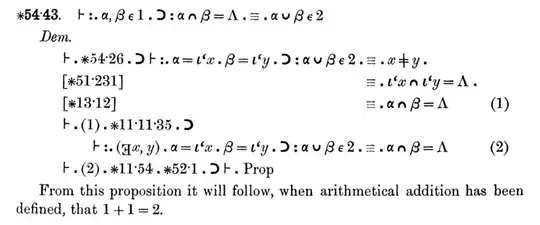Everyone knows that 1+1=2, but how would one mathematically prove that this equation is true? Or can you?
Asked
Active
Viewed 528 times
0
1 Answers
0
You can! Math is axiomatic, so the exact proof would depend on which axioms you choose (some might choose $1 + 1 = 2$ as an axiom itself, instead of a theorem).
Whitehead and Russell's Principia Mathematica was an attempt to prove all of math from first principles. They famously got to showing that $1 + 1 = 2$ on page 379.
Michael Biro
- 13,757
-
People always mention Principia Mathematica, and it always sounds horrifying. But I have heard that nowadays there are much more efficient ways to develop the foundations. So perhaps we shouldn't make too much of the fact that the proof of $1+1=2$ appeared on p. 379. – littleO Jan 22 '20 at 04:08

1+1=2 proofinto google, the entire first page is relevant to the question being asked, including some links to stackexchange duplicates as well as a link to the wikipedia page on the aforementioned book – JMoravitz Jan 22 '20 at 04:17